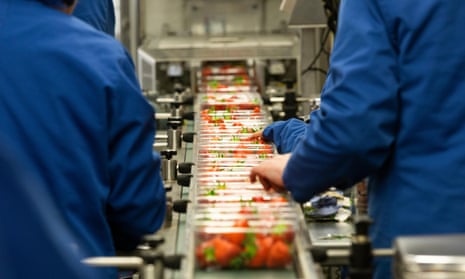Britain’s demand for cheap food could be fuelling the spread of the coronavirus in factories, a leading health expert has warned, as analysis shows nearly 1,500 cases across the UK.
Cramped conditions in some factories and in low-paid workers’ homes, spurred by the UK’s desire for cheaply produced food, may have driven infection rates in the sector, according to David Nabarro, a World Health Organization special envoy on Covid-19, speaking in his capacity as a co-director of the Institute of Global Health Innovation at Imperial College London.
In the early stages of the pandemic, the UK avoided the scale of Covid-19 outbreaks seen in meat factories and other food processing plants in countries such as the US. But a Guardian analysis suggests that reported UK outbreaks of the disease are now increasing in frequency, with examples of cases spreading into the wider community.
While there is no suggestion of breaking social distancing rules, factories by their nature involve large numbers of workers under one roof.
Unions say most of those working in UK meat, poultry and other mass food production plants are foreign migrant workers who share accommodation and transport.
Nabarro raised the issue of low pay, which may mean employees exposed to the virus feel pressured to keep working. A culture of cheap food was based on driving production costs down – but at a price, he said.
“It may well be that in keeping production costs down, we end up with a situation where the people who work in food processing are under very, very tough working conditions and are paid relatively small amounts of money compared with other roles.
“So one could argue that this is not so much structural issues in society as a consequence of the perpetual pressure to get quality of food up and prices down. And so a part of this may require thinking carefully about how much to pay for particular kinds of food.”
Nabarro said working and living conditions for food factory staff could create a perfect storm for the spread of the coronavirus. “If people are living in very high-occupancy, cramped conditions and they’re sharing transport, that obviously is another way in which transmission is likely.
“So, if you add it together, the conditions inside the plants seem to contribute to the spread. The conditions of living and travel seem to contribute to spread. And the way in which money is handled if you’ve got to isolate may also contribute to spread.
“So, the hypothesis that I have developed is that, in these cold plants where work is very intense, there are quite a lot of factors that come together that make infection with the virus more likely.”
His comments may be seen to echo criticism of fast fashion for driving a culture of cheap clothing.
Figures compiled by the Guardian suggest at least 1,454 cases linked to food factories across England, Scotland and Wales.
Northern Ireland, whose authorities do not publish specific statistics on the number of workers in the region’s large food processing sector, made food plants secondary only to healthcare when it was considering priorities for its contact-tracing app.
Paula Bradshaw, an assembly member for South Belfast, said: “The danger of meat factories and food processing plants is already well established across the world, and that is why they were made second highest priority [behind healthcare settings] by the Public Health Agency when promoting the contact-tracing app.
“The risk is heightened precisely because we still do not fully understand why the hazard is so significant – there is some thought that it may be to do with lack of adequate ventilation or even the UV light, but it is unclear. What is absolutely clear, however, is that the safety of workers in food processing plants must be our No 1 priority.”
In June, Boris Johnson acknowledged the problem in food processing plants, telling the Commons that ministers were investigating, but neither the government nor health officials were able to produce data looking specifically at it.
According to figures from Public Health England, workplaces of any type accounted for only one outbreak linked to Covid between the beginning of the UK’s epidemic and mid-May. From then on, the number of cases began to climb until workplaces became one of the most common settings for outbreaks, ahead of hospitals and prisons, and second only to care homes.
By the week ending 9 August, the latest for which PHE has released figures, workplaces accounted for 20% of the suspected Covid outbreaks in England. While this can partly be attributed to the closure of schools, the figures demonstrate an increasing number of outbreaks long before the UK government advocated returning to work from 1 August.
This article was amended on 24 August 2020 to make clear from the outset that David Nabarro was speaking in his capacity as an Imperial College London academic. An earlier version also wrongly described Nabarro as a professor at University College London. This has been corrected. The headline and standfirst have also been amended for clarity.
